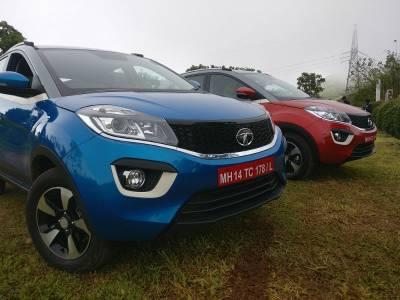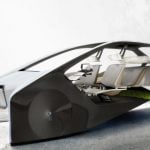 The Nexon from Tata Motors will come with a petrol and diesel option. An automatic variant is expected later.
The Nexon from Tata Motors will come with a petrol and diesel option. An automatic variant is expected later.First showcased at the 2016 Auto Expo in New Delhi, the car’s journey to reality, according to Tata officials, has been one with an enormous attention to detail. And it is quite evident from how the car has been designed – both inside and out.
Exteriors:
The Nexon is not conventionally boxy as one has increasingly become accustomed to in the SUV and compact SUV design language. Instead, the designers attempted to incorporate the traditional squarish-frame of an SUV with the sleek and sloping lines of a sports car. And they have pulled off quite a good looking vehicle with little resemblance to anything already on the road.
The front of the vehicle is characterised by what the company terms as the ‘Humanity Line’ which stretches from one end of the smoothly flowing projector headlight with DRLs to the one at the other end. Interestingly, Tata has chosen to use chrome only here – something which other manufacturers have begun depending on extensively in their newer cars. Encompassed above the chrome line and between the headlights is the honeycomb grille which may be a take forward from some of Nexon’s siblings and yet, sits well into the overall design philosophy.

The car though looks its unconventional best from the side and the rear. The ground clearance of 209mm is evident visually and the company says it is class-leading. The large wheel arches add further character to the side profile and nestle the 16-inch alloys well. That the car stands tall also helps occupants with a commanding view of the outside world.

There is also a plastic strip running through the sides and all through the back which is ceramic-ish and goes on to lend a definitive character to the car. This is especially true for the X it forms at the rear.

The rear of the vehicle has clean and clear lines, underwhelming LED tail lights and shark fin antennas on top of a gunmental grey roof which stoops in a coupe-ish style to complete a very unique design.
Interiors:
The Nexon on the inside is defined as much by an upmarket feel as a spacious one. The large windows really help in giving the cabin a generous feel, and hence the commanding view mentioned previously. In addition, there is more than adequate space for four adults and a child for long drives in this car. The rear seats fare better in terms of cushioning and lumber support than the front seats which are a tad too stiff, and despite the stooping roofline, tall passengers at the back are not likely to feel confined. The rear seats also have a 60:40 split functionality which opens up more space in the trunk – already quite generous at 350 litres. For the record, the Brezza (328 litres) and EcoSport (346 litres) have marginally smaller trunk space.
The biggest highlights of the car on the inside though are the premium quality of materials used and the plethora of creature comforts. The dash is made of decent plastics and it is easy to see just how many steps Tata Motors has taken forward in terms of their attention to detail. Having said that, the housing for the ORVMs on the A pillar felt wobbly and almost came off on one occassion. This needs to be especially highlighted because it is the only blemish in an otherwise flawless cabin quality. Then there are the little elements incorporated all around which show the company thought like a passenger rather than an engineer when designing this car.
So, one can put an umbrella on either of the two front doors and the hidden drain pipes will dump rain water on the outside. There is an open sunglass holder with a velvet layer to prevent scratching. Then there is a really big dashboard which not only gets cooling feature but also a removable tray for food items. These are just some of the well-thought out additions – apart from the usual USB and AUX port, rear AC vents, folding rear arm rest etc that make the Nexon’s cabin stand out.
What also helps the cabin stand out is the floating infotainment system which is adequately responsive to touch. The Harman ConnectNext technology has been taken forward into this car and it does the job well. The screen also doubles up as a rear-view camera – and that’s not just when the reverse gear is engaged.
A point that deserves a mention here is the rather thick A piller on either side which could make taking turns slightly precarious.
Drive:
The Nexon will be offered in two engine options – 1.2 L Turbocharged Revotron Petrol and 1.5 L Revotorq Diesel which are mated to a six-speed manual transmission box. Tata officials confirmed that an automatic transmission option for the car is currently under development.
There are also three drive modes which add a customisable option to how the car moves. This is changed by a smart dial which sits just below the gearbox and every mode is accompanied by a colour scheme change on the infotainment display. So, City gets a blue theme, Eco gets green while Sports gets a red colour theme. By default, the last chosen mode is the starting mode when the car is next started.

Speaking of starting the car, the most unique feature in the Nexon is that it comes with a wristband. With the youth of the country being the primary target customer base, Tata Motors have incorporated this novel – yet practical feature – to help car owners keep the keys at home and use only the wristband to open, start, drive and lock the vehicle. The band itself is like any other fitness band in the market – minus a display and touch input – and is likely to be part of only the top-end spec.
There is also a start-stop button on the top-end trim. The most noticeable element when the petrol variant starts is the sheer level of refinement achieved by Tata engineers. At idle, it is difficult to ascertain if the ignition is even on. That said, the petrol variant is well planted and drives smooth. While both engines produce 110 Ps of power, the 1198cc petrol engine produces 170 Nm of torque compared to 260 Nm on the diesel sibling. What this translates to on the road is less pulling power in the petrol variant – very evident on hilly regions. The car has to be constantly downshifted when making climbs and the sports mode is not too much of help here either. On level roads though, the car is quite refined.

After the petrol, the diesel comes across as the real mean machine. The Nexon in this variant has a completely different character and pushes forward eagerly. Power comes in a much more linear manner especially when compared to the Brezza which takes a while to build up the thrust. That said, the Brezza is likely to race forward once its Fiat-sourced 1.3 diesel engine finds its sweet spot even as the Nexon continues to pull clean. There is a bit of turbo lag in the Tata car but kudos for keeping it to a minimum. The engine grunts too but once again, it is much more refined that what we have been accustomed to in erstwhile Tata cars. Ditto for cabin noise insulation which is as good as any other diesel rival.

As for mileage, the petrol variant claims to deliver up to 19kmpl while the diesel is likely to return up to 23kmpl.
Will it bring down its rivals? Unlikely. Will it uplift Tata Motors? Most likely.





